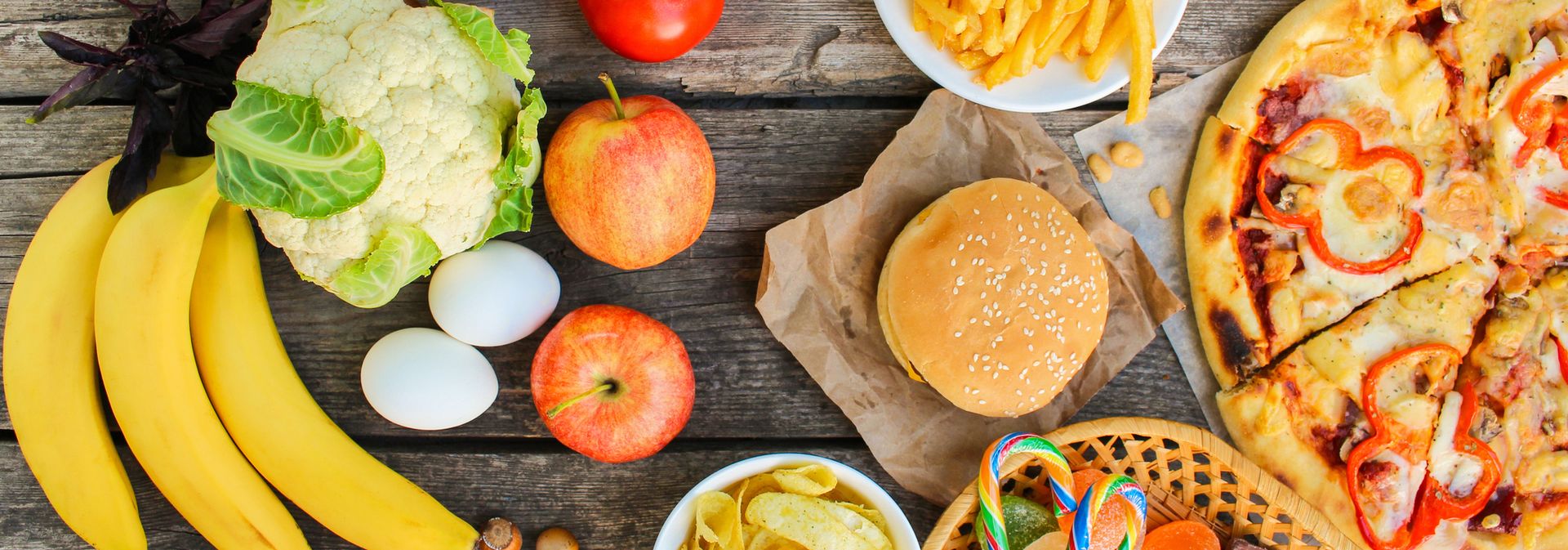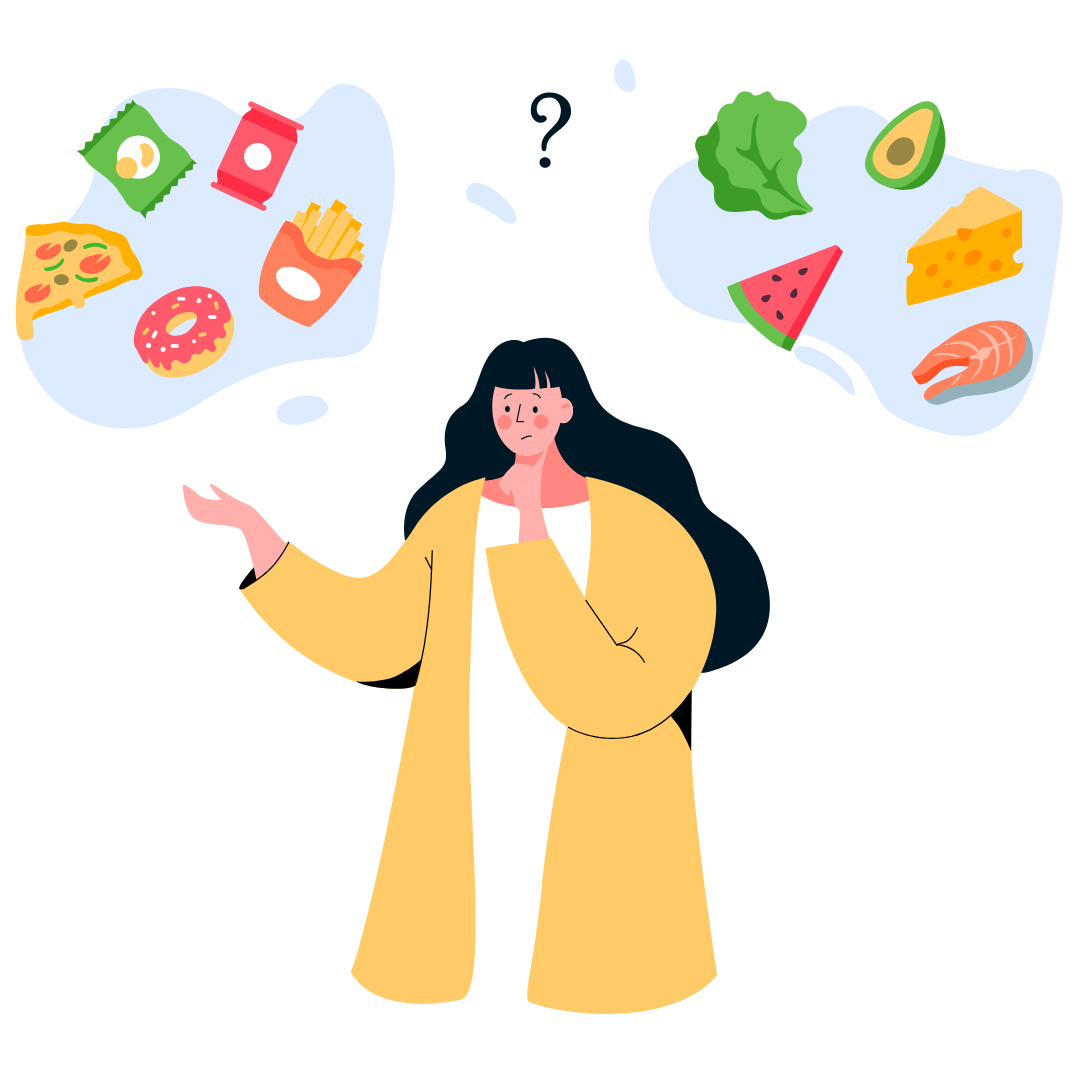“Healthy vs. Unhealthy Food” Isn’t a Good Mindset—and It Can Cause Harm
Guilt-free. Decadent. Healthy. Indulgent. Clean. Junk.
The words we use when we talk about food can be full of judgment masquerading as health advice. It’s what’s lurking behind the concept of food morality.
Labeling foods with moral categories can bring feelings of virtue (“I’ll be good and order the salad!”) or shame (“I was bad and ate the brownie.”). It also ignores the many ways in which food nourishes us—physically, emotionally, and culturally.
“Polarizing food with moral labels oversimplifies something that is very complex,” says Clinical Dietitian Jill Chodak, RD, of the Center for Community Health & Prevention at the University of Rochester Medical Center.
“The problem is that those labels give food moral power, but no single food is inherently good or bad. And those labels don’t take into account emotional health, food insecurity, cultural differences, or other things that make us unique individuals.”
Taking food guilt and judgment off the table—aiming for food neutrality—means embracing the fact that food should really be more about individual needs and preferences and finding the balance that works for you.
“Balancing our wants as human beings with what our body metabolically needs differs from person to person,” says Chodak. “Each of us has different wants and needs that contribute to balance in our mental and physical health.”
Much like people, food is complex. And both deserve more than a simple “good” or “bad” label. Here’s a better way to look at it.
Can pie be good for you?
“Some foods you eat because you associate them with good memories, which is ‘healthy’ in its own way,” says Family Medicine Physician Holly Russell, MD, who makes apple pie with her kids as part of their Thanksgiving tradition.

“Most people wouldn’t call pie a ‘healthy food,’ but making and eating it together has become a joyful part of our celebration. I think it’s important to take a step back, consider the positives that come from different foods, and reframe how we think about them without moral judgment.”
One way to do that is to understand how the food industry influences language around food, applying moral value through brand names, packaging, and marketing.
The word “nutritious” is a good example, Russell says. Although it literally describes something that nourishes us, when it’s blazoned across a food package it’s aiming to tell you that food is good for you.
“There are different ways of nourishing ourselves—comfort, relationships, vitamins, nutrients—and all are important and valuable,” Russell says.
Food guilt brings food anxiety
Baked into food morality is the notion that eating “bad” foods makes you fat and, consequently, unhealthy—despite a lack of scientific evidence linking weight and health. That mindset influences attitudes about body size that can have harmful side effects, including discrimination and body shaming. Moral food labels can also influence food restrictions that can lead to disordered eating.
“Our culture worships thinness, which underlies why we assign morality to food,” says Russell. “I think in the U.S., we have lost sight of the fact that a lot of food’s purpose is that it tastes good and that it’s OK to enjoy it. Many other cultures believe that.”
“Whether or not we are saying out loud that foods are good and bad, if we are so fixated on our weight and are role-modeling food restriction, we’re promoting food morality,” Chodak adds. “The truth is that all foods can fit. It’s a matter of discovering how they fit for you and your family.”
Why do I feel guilty after eating?
Shifting from food morality to food neutrality will take time and a conscious effort to deprogram our thinking. Here’s some food for thought that may help.
Know it when you see it.
From well-intended school curriculums to ads for weight-loss drugs, our culture clings tightly to food morality and fat bias. Recognize that judgment around food is everywhere and change won’t come easily, but you can start to make a difference for yourself and your family.
See the bigger picture.
There is value in understanding the nutrients in our food (like vitamins, fiber, protein), what they do for our bodies, and why they’re an important part of what we eat. But there’s also value in shared meals, traditions, and enjoying food. “The idea of people enjoying their meals and time together is so much more important than calories and fat content,” Russell says.
Weighing wants vs needs.
Wanting something doesn’t make it a bad thing any more than needing something makes it a good thing. Yet when it comes to food, we may think we’re “being good” by choosing needs or feel shame for having what we want. “Balancing our wants as human beings with what our body metabolically needs varies from person to person,” Chodak says. “And that balance should encompass all things—including our mental and physical well-being.”
Guilt has no place on the menu.
If you are feeling guilty about food, try to understand what’s beneath it. Have a craving? “Maybe allow yourself that piece of cake, let yourself relish it, and move on,” Russell says. “Sometimes not letting yourself have it occupies more of your brain and you end up eating it anyway and not enjoying it.”
Help with Healthy Living
When it comes to improving health, even small changes have a lasting impact. Programs at the Center for Community Health & Prevention help people make small changes they can maintain for life.
Our Programs


:max_bytes(150000):strip_icc()/Pasta-opener-FT-MAG-0225-ae97e99ca7c64a2c87aa02109fe2e9ba.jpg)














